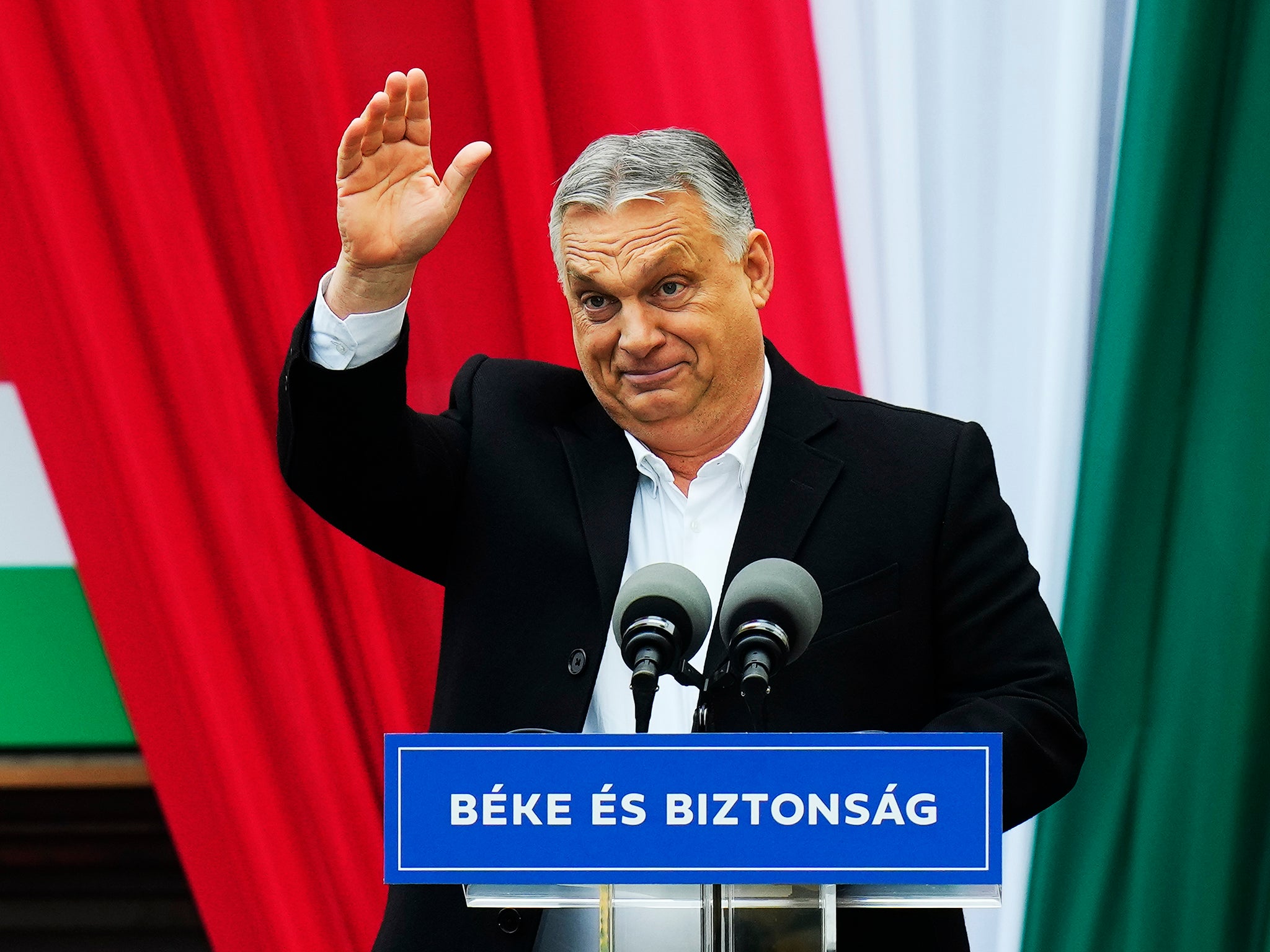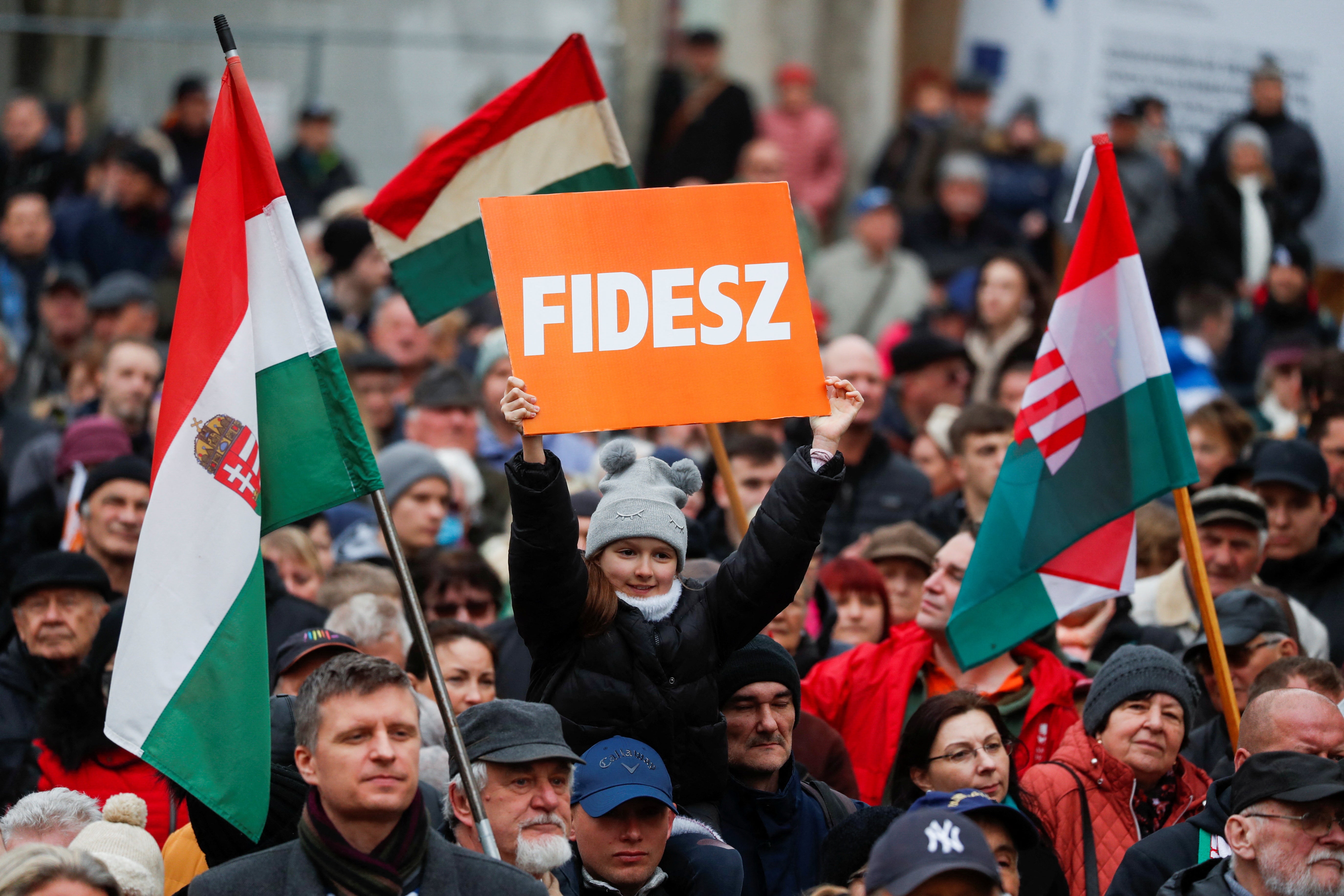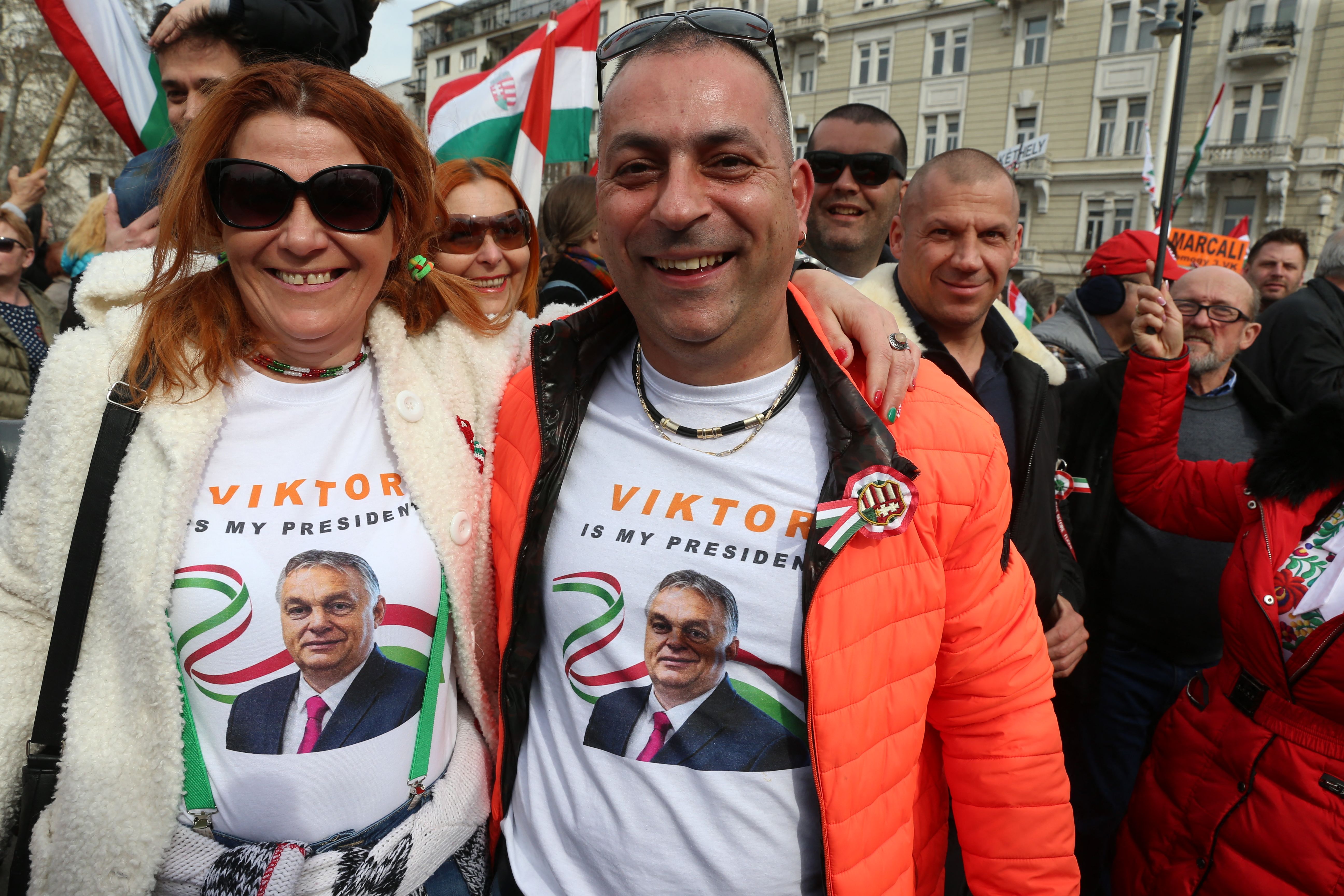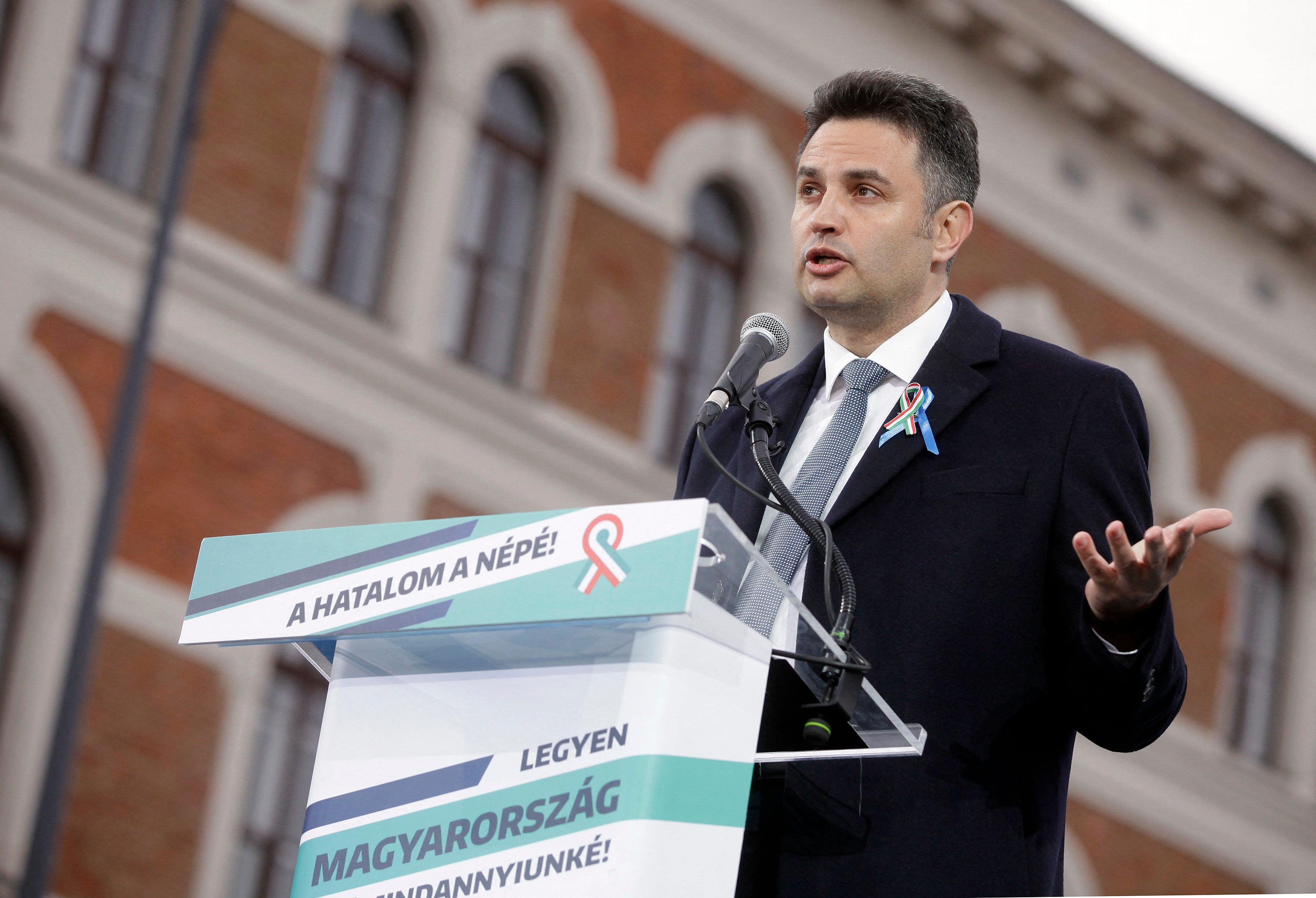Hungary’s Orban set for victory in toughest election challenge under shadow of war in Ukraine
Concerns over electoral fraud and criticism over ties to Russia are unlikely to affect Viktor Orbán’s chances of securing a fourth consecutive term in Hungary’s polls, reports Amanda Coakley in Budapest


Ahead of Sunday’s pivotal election, which presents Hungarian prime minister Viktor Orbán with his toughest challenge yet from a united opposition determined stop him from securing a fourth consecutive term in office, a group of handpicked ballot counters filed into Székesfehérvár’s city hall to swear an oath of honesty.
Mostly residents of the central city and its surrounding villages, the group was aware of the momentous task ahead of them.
Should Mr Orbán and his ruling Fidesz party claim victory as is widely expected, opponents fear Hungary, a central European country of 9.6 million, will continue to rank among the least democratic states in the European Union.
Should United for Hungary – the six-party opposition led by small-town mayor Péter Márki-Zay – win, the country will have to battle rising inflation and regional instability with one arm behind its back, following years of Fidesz’s corruption of state infrastructure.
Since returning to power in 2010 – he was previously in office from 1998 to 2002 – Mr Orbán has hollowed out Hungary’s independent media landscape, undermined the judiciary, placed his supporters in key positions throughout the state, and engaged in a values war with what he calls the “liberal west”.
At the event in Székesfehérvár, mayor András Cser-Palkovics – a member of Fidesz – was bullish as he issued the oath and followed it up with a hearty rendition of the national anthem, “Himnusz”.
“Fidesz only has as much power as was given to them by the people … this will be a fair and democratic election. The trust people have in Viktor Orbán is very evident,” he told The Independent.
Despite such displays of protocol however, concerns are mounting around the integrity of this weekend’s election.
For the second time in the history of the EU, the Organization for Security and Cooperation in Europe (OSCE) will send a full observer mission to Hungary made up of 200 monitors.

The Hungarian government, which has been critical of the OSCE, have set up their own counter observation mission composed of Polish lawyers from the ultra-conservative group Ordo Iuris – they have influenced the rolling back of women’s reproductive rights and campaigned against so-called “gender ideology” in Poland since their establishment in 2013.
The OSCE mission this week raised the alarm about several factors in the polls, including bias in the public media and the risk of postal vote abuses.
It is not just the prospect of election fraud and tampering that is troubling the international community.
Fidesz is using the state for campaigning and keeping a firm control on the media
Fidesz’s dominance over state media and its manipulation of state resources for political gain has also prevented opposition messaging from cutting through into the government’s rural heartlands.
The government has used coronavirus databases to encourage people to vote for Fidesz and the state-run media has been awash with sympathetic coverage of Mr Orbán and his neutral stance on Russia’s invasion of Ukraine in late February – an issue that has tipped the election off its axis and become a central concern for Hungarians who fear regional instability.
“It’s absolutely clear that Hungary is not a democracy, so you cannot declare this as a democratic election. It is not a free and fair election, it is a dishonest election where Fidesz is using the state for campaigning and keeping a firm control on the media,” said Andras Bozoki, a professor at the department of political science at the Central European University, and Hungary’s former minister for culture.
“So I think there is a higher chance for Fidesz to win [this election], but under democratic conditions the opposition would be able to succeed.”
However, the Fidesz party has regularly brushed off such criticism, and speaking to hundreds of supporters on Friday, Mr Orbán accused his opponents of corruption.

“A lot of people say the [united] opposition is cheating. What’s surprising about this?” he said. “We have to win on such a difficult track, even in such circumstances.”
Polling from the group Median has suggested a sweeping victory for Fidesz, although the united opposition has been keen to highlight polls that have frequently been incorrect in previous mayoral elections.
One factor that has boosted the government ahead of the government is its stance on Russia’s invasion in Ukraine, which has seen more than 4 million people flee the country, about 380,000 of whom have arrived in Hungary so far according to UN figures.
Since the first Russian missile hit Ukrainian soil on 24 February, Budapest has been wary of overtly criticising Moscow despite backing EU sanctions and initially denouncing the conflict.
Mr Orbán has always been willing to sacrifice international relationships to win in domestic politics
This refusal has drawn the ire of Ukrainian president Volodymyr Zelensky, who called out Mr Orbán during an address to the EU council on 25 March. “It’s time to decide who you are with,” the Ukrainian leader said.
Hungary imports most of its oil and gas from Russia, and has refused to supply weapons to Ukraine. Mr Marki-Zay argues that the country should give arms to Kyiv.

Budapest’s stance has also infuriated The Visegrad Group, or V4, comprising Poland, the Czech Republic, Slovakia, and Hungary. This week, the Polish and Czech defence ministers refused to attend a meeting of the group in Hungary – citing the country’s Kremlin sympathies and refusal to consider sanctions on Russian oil and gas.
“I am very sorry that cheap Russian oil is more important to Hungarian politicians than Ukrainian blood,” Czech defence minister Jana Cernochova said on Twitter. Former Polish prime minister and ex-president of the European Council, Donald Tusk, described the snub as a “not-so-splendid isolation”.
“Orbán’s closest allies are sacrificing their relationship with Budapest when it comes to security and I think it will take a lot of time to restore these relationships,” said András Bíró-Nagy, director of Policy Solutions Hungary.
“If he sticks to this position, relationships with central and western Europe will become untenable and I think that will be embarrassing for him. That said, Mr Orbán has always been willing to sacrifice international relationships to win in domestic politics, so right now he isn’t focused on foreign policy, he is determined to win the election.”
On Sunday, Hungary’s electorate will not only be voting on the country’s leadership, but there will also be a plebiscite on LGTBQ+ rights masked as a vote on “child protection”.
Last summer, Hungary’s parliament passed a law that included a ban on showing content of homosexuality or gender reassignment to minors. The move triggered fierce backlash from Brussels, which began legal proceedings against Hungary and its illiberal ally Poland over their targeting of LGTBQ+ rights.
The Hungarian government responded by announcing a referendum on the issue to show the legislation had universal support. Since returning to power in 2010, Mr Orbán has increasingly sought to promote social policies that he says safeguard traditional Christian values against western liberalism.

Speaking in her office in downtown Budapest, veteran human rights campaigner Mária Kristófy explained why she has long predicted such a vote taking place.
“This government always needs an enemy. It’s been migrants, liberals, it was only a matter of time before they came for us. But we’re pushing back, and a coalition of human rights groups have come together to encourage people to soil their ballot instead of voting in this so-called referendum,” she told The Independent.
Across Budapest billboards have been erected showing a mother cradling her infant child and the words “Let’s Protect Our Children”, a sign of the government once again linking the LGBTQ+ values to paedophilia.
With the overshadowing of Russia’s war in Ukraine, most Hungarians believe Mr Orbán will claim victory this weekend. While the united opposition have not stopped their relentless campaigning across the country, the power of the government’s spin machine has been efficient at drowning out their hard work and strong messaging.
“It’s been a real uphill battle but we have knocked on as many doors as possible – this ground game has been essential”, said Katalin Cseh, a member of United for Hungary. “Márki-Zay’s personality has shone through and I hope we can pull through this weekend.”



Join our commenting forum
Join thought-provoking conversations, follow other Independent readers and see their replies
Comments